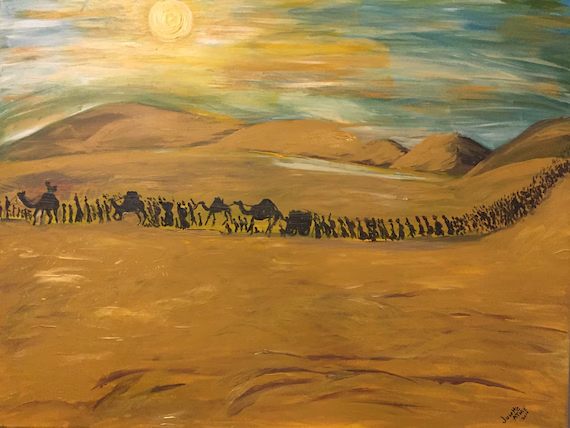Jesus and his Disciples
Jesus went to Capernaum, a town near Lake Galilee.
There he talked to the people about God. And healed the ones who were ill.
News of his teaching spread quickly and, everywhere he went, people crowded around him to hear what he had to tell them.
One day. Jesus was walking along the shore of the lake. As usual, crowds of people came to listen to him.
There was a boat pulled up on the shore, owned by two fishermen. Peter and his brother. Andrew. Jesus climbed on board.
'Please push the boat onto the water and row a little way out on the lake, so I can speak to the people, he said.
The two men did as he asked.
After Jesus had spoken to the people, he told Peter and Andrew to row farther away from the shore and put out their fishing nets.
'It's no good. We fished all night and caught nothing, said Peter. 'But we'll do as you say. When he and Andrew began to pull in the nets, they were so full of fish, the nets were almost breaking.
Peter and Andrew shouted across to two other fishermen. James and John, in their boat. "Come and help us, they called.
James and John helped them to pull in the nets. Together they filled both boats with fish.
When the four men saw how many fish they'd caught, they were very frightened and knelt down in front of Jesus.
'Don't be afraid, said Jesus. 'Come with me, and I will make you fishermen of people.
Peter and Andrew. James and John rowed their two boats back to shore and unloaded the fish.
Then they left their boats and went with Jesus on his journeys through the towns and villages around Lake Galilee.
One day Jesus saw a man who worked for the Romans collecting taxes. He was a rich man whose name was Matthew.
The Jewish people hated their Roman rulers, but hated the tax collectors even more, as they often demanded more than was due and grew rich.
Jesus looked at Matthew and said; 'Come with me.
Matthew stood up and, without saying a word, went with Jesus and the other disciples.
Matthew gave a feast in his house for Jesus and many other people, including tax collectors. Some of the religious Jewish people saw Jesus there.
They asked his friends why such a good man as Jesus would sit down and eat with so many bad people.
Jesus heard the question and answered; 'Healthy people don't need a doctor. It's the sick who need help. I've come to ask the bad people to change their ways. The good people don't need me.
One evening. Jesus walked high up a mountain and stayed all night, praying to God. In the morning, he came down again, and he chose twelve disciples to help with his work.
As well as Peter, Andrew, James, John and Matthew, there was Philip and Bartholomew, Thomas, another James, Simon, Judas and Judas Iscariot.
These twelve men became his special friends and followers.
They went everywhere with him, listening to his teachings and watching the wonderful things he did. He told them what God had sent him to do.











Comments
Post a Comment